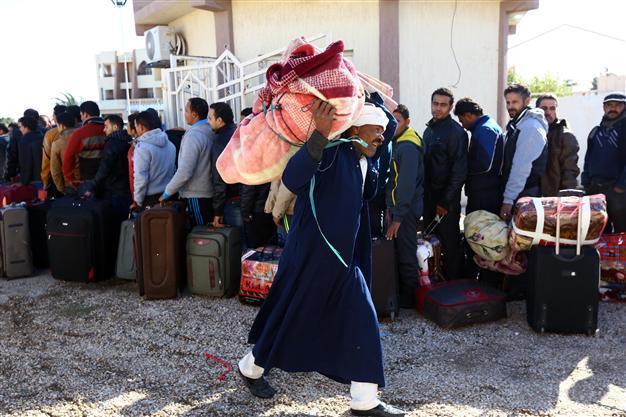15,000 Egyptians flee Libya after warning
CAIRO - Agence France-Presse

Egyptians queue up with their belongings as they wait to enter Tunisia, via the the Ras Djir border crossing, on Feb. 23, 2015 for a flight evacuating them back to Cairo. AFP Photo.
Almost 15,000 Egyptians have flocked home from war-torn Libya via the border crossing at Sallum, state media reported on Feb. 23, after Islamic State of Iraq and the Levant (ISIL) group jihadists murdered 21 Coptic Christians.
Last week Egyptian and Libyan warplanes hit ISIL targets inside Libya after the jihadists released a gruesome video on February 15 showing the Christians, 20 of them Egyptian, being beheaded.
Cairo has since urged the hundreds of thousands of Egyptians working in Libya to leave, and also chartered planes to fly many of them home from Tunisia, Libya's western neighbour.
At least 14,585 have heeded the call and returned through Sallum in northwest Egypt, state news agency MENA reported.
It said they included 3,018 Egyptians on Monday alone, but did not specify how many were Christian.
A transport ministry spokeswoman in Tunisia said at least 1,000 Egyptians who had fled Libya have been airlifted home on planes chartered by Cairo since Friday.
A Tunisian customs official said an unspecified number of Egyptians were also waiting on the Libyan side of the border, hoping to cross.
Late on Monday a plane carrying 231 Egyptians airlifted from Tunisia earlier in the day landed at Cairo airport, the fifth such Egypt Air flight bringing Egyptians home, an airport official said.
Last July, thousands of Egyptians fleeing violence in Libya were stranded for days at the border with Tunisia, with authorities refusing to admit them until Cairo had arranged their return home.
Tunisia was flooded by expatriates fleeing Libya during the 2011 uprising that toppled and killed dictator Moamer Kadhafi, and struggled to cope.
Days after the revolt erupted, Egypt sent military aircraft to Libya to evacuate its citizens trapped by the violence.
At the time, officials said 1.5 million Egyptians worked in Libya, mostly in construction and services, and formed the backbone of the expatriate workforce in the oil-rich nation.
Hours after ISIL released the video last week showing the beheading of the Christians, Egypt carried out air strikes against ISIL targets inside Libya.
On Sunday President Abdel Fattah al-Sisi said 13 ISIL targets were hit in the raids.
On Monday, rights group Amnesty International criticised Egypt over the strikes, saying its air force failed to take the necessary precautions in the raids which also killed seven civilians in a residential neighbourhood of Derna.
"Egypt has now joined the ranks of those placing civilians at risk in Libya. The killing of seven civilians, six of them in their own homes, must be investigated, as it appears to have been disproportionate," Hassiba Hadj Sahraoui, Amnesty's Middle East and North Africa deputy director, said in a statement.
Amnesty said that during the February 16 strikes, two missiles were fired into a heavily populated residential area called Sheiha al-Gharbiya near Derna's university.
One killed a mother and her three children aged between three and eight, and wounded their father and another child, it said.
A second missile that hit a street killed three more civilians.
Amnesty said it has found no evidence of any military target in the area, and the strike came without any prior warning to civilians.
Libya's air force chief Saqr al-Jaroushi told Egyptian television hours after the raids that at least 50 people were killed when Egyptian and Libyan warplanes struck ISIL targets.
In a televised address on Sunday, Sisi said the Egyptian air strikes chose ISIL targets "carefully".
"No one should think we attacked civilians."
Amnesty said Cairo should have taken the precaution to "avoid or at least minimise civilian casualties".
